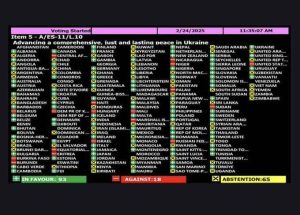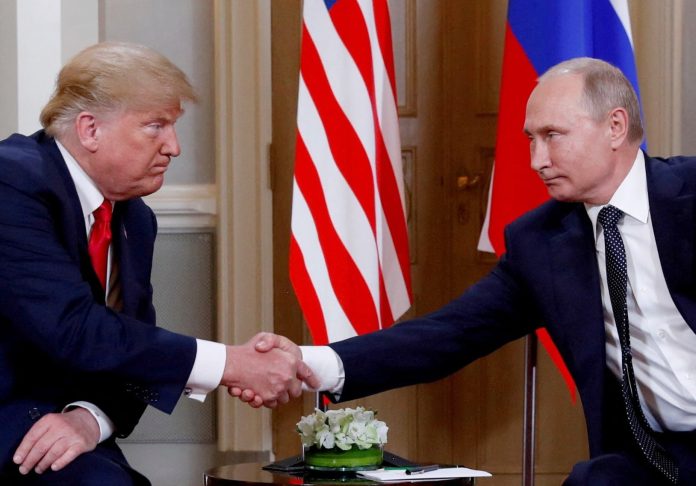By Anthony Emeka Nwosu
The recent United Nations vote on a resolution condemning Russia’s invasion of Ukraine has sent shockwaves through global diplomatic circles. In an unprecedented move, the United States voted against the resolution, aligning itself with Russia, North Korea, Belarus, and 14 other nations with strong ties to Moscow.
This vote signals a significant departure from the Biden-era stance on Ukraine and has led to widespread speculation about the geopolitical implications. Is this a tactical move toward a U.S.-Russia realignment, or does it indicate the beginning of a broader global power shift?
Breaking the Mold: A New U.S. Foreign Policy Direction?
For years, the U.S. has been one of Ukraine’s strongest backers, providing military aid, sanctions against Russia, and diplomatic support. However, this latest vote suggests a reassessment of America’s global priorities. With former President Donald Trump expected to play a significant role in shaping future U.S. policies, many see this as an indicator of a potential shift toward isolationism or even a strategic pivot away from Europe’s conflict zones.
Some analysts argue that this is a calculated move by Washington to de-escalate tensions and push for an end to the war. Others, however, see it as a stark reversal that could weaken NATO’s influence and strengthen Russia’s geopolitical position.
Public Reaction: Celebration or Concern?
Opinions on this development are deeply divided.
George Bennett, a political commentator, sees this as a positive step toward acknowledging Russia’s grievances, stating:
“Now, that is a positive step forward. The facts are that Russia, in this case, was the victim of NATO interference and the EU and previous U.S. regimes. I have always viewed this as an overreach that gave Russia no choice. Now, can we get Zelensky, the global panhandler, out?”
Meanwhile, Trump supporters are celebrating the vote as a major victory for the “America First” movement, with one pro-Trump advocate, Ted, remarking:
“This is arguably the greatest moment in history for the America First movement. The courage shown by President Trump to go against what Biden and the media forced us to believe is almost unfathomable. I salute you, President Trump. May God bless you, sir.”
This perspective suggests that under a potential second Trump presidency, the U.S. could withdraw from European conflicts, refocus on domestic priorities, and even seek stronger ties with Russia.
A Historic Parallel: U.S. and Russia Together Again?
The last time the United States and Russia found themselves aligned in global affairs was World War II, when both nations joined forces to defeat Nazi Germany. Some analysts suggest that this latest UN vote might be a precursor to a similar alignment—one that could reshape global power structures over the next decade.
One observer speculated:
“For the next four years, we’re going to see some collaborations between the U.S. and Russia. Stepping stones are being laid now, and by 2026, it’ll all make sense. The world will move past this conflict into a new geopolitical era.”
This raises important questions: Could this vote be an early step toward a U.S.-Russia partnership, one that challenges China’s growing influence? Is Washington moving away from NATO’s traditional stance in favor of a more flexible foreign policy approach?
Potential Fallout: What This Means for Europe
While some see this shift as a positive move, others warn of potential blowback, especially for Europe. A commentator under the alias ShiVA raised concerns over possible security threats stemming from the war:
“The U.S. wants to end the war as soon as possible. However, a Nazi-linked issue in Ukraine could spiral into terrorism, driven by Ukrainian vengeance against their sponsors—especially Europeans. This should alarm Europeans, as geographical distance makes the U.S. an unlikely target for retaliation.”
This sentiment reflects a growing fear that Europe could bear the brunt of any retaliatory actions if Ukraine feels abandoned by its Western allies. It also highlights the geopolitical advantage the U.S. enjoys due to its geographical distance from the conflict.
No Permanent Friends or Enemies in Politics
The U.S. voting shift serves as a stark reminder that international alliances are fluid. Rizwan Riaz succinctly put it:
“This is the best example of the reality that there is no permanent ally or enemy in international politics.”
This reality could redefine global alliances in the coming years, with potential diplomatic reconfigurations between the U.S., Russia, China, and the EU.
The Media’s Role: Shaping Narratives or Distorting Reality?
Some believe that mainstream media has been manipulating the narrative around the Ukraine conflict. A commentator named Sapientia Hope argued that this U.S. vote should not be shocking to those who have been following the deeper geopolitical trends:
“If you know the truth, this wouldn’t be so shocking to you. The media have been getting paid handsomely to lie in the former mainstream legacy media. The one where they said Putin (who has been in power for two decades, mind you) randomly invaded Ukraine for his ‘ambitions.’ Times are changing. The world is shifting. Trump knows this and is doing what is good for the U.S. and world peace.”
If this perspective holds any weight, the U.S. vote could be a sign that the mainstream narrative about Ukraine and Russia is beginning to unravel.
What Happens Next?
With this unexpected U.S. stance at the UN, the world is now watching closely. The key questions remain:
- Will the U.S. push for a diplomatic settlement between Russia and Ukraine?
- Is this vote an isolated event, or the beginning of a long-term shift in U.S. foreign policy?
- How will Europe, NATO, and Ukraine respond to what they may see as an American retreat?
- Could this shift ultimately benefit Russia and weaken Western influence in global affairs?
Regardless of where one stands, this move marks a turning point in international diplomacy. If the U.S. continues on this path, the world could be on the verge of a new era of global power dynamics—one where traditional alliances are redefined, and the old world order is left behind.




